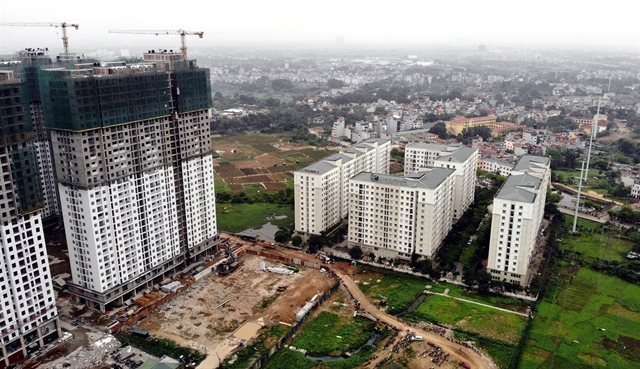Many fees slashed to support businesses post-pandemic
The Ministry of Finance has slashed administration fees in numerous sectors to help the economy get back on its feet when the Covid-19 pandemic eases.
 |
| EcoHome housing project under construction in Ha Noi. A number of administration fees in sectors including construction, travel, banking and water resource were cut to support businesses after the Covid-19 pandemic. |
Construction companies, travel firms, banks and credit institutions as well as water resource businesses will all be given a helping hand.
Reductions range from 20 to 50 per cent and took effect from May 5. They will remain in play until the end of the year.
New banks can expect a massive 50 per cent reduction in licensing fees meaning they now just pay VND70 million (US$3,000). Business adjustments and extension of operation fees will now be VND35 million.
Several costs in the construction sector have also been reduced by half, including fees for capacity certificates, basic and technical design evaluations and construction evaluations.
There are also big breaks for tourism companies as well. From May 6 until the end of the year, licence fees for international and domestic travel services will be halved as well as the costs of tour guide cards.
The fees in the water resource sector would be cut by 20 per cent while the fee for using hydro logical data by 30 per cent.
Once the year ends, all the fees will return to their normal prices.
Some proposed cuts rejected
Original draft proposals from the Ministry of Planning and Investment were first rejected by the Ministry of Finance who did not agree with some of the plans.
In the draft proposed in mid-April, the plan was to slash corporate income taxes by 50 per cent for the whole of 2020 for all small and medium sized enterprises (SMEs) and cooperatives. But the finance ministry said this proposal should not be included as it could overlap future policy changes and a VAT reduction would not affect overall production costs.
It also suggested a similar sized cut in Value Added Tax (VAT) for companies who are struggling to help them reduce production costs.
In response, the Ministry of Planning and Investment said instead of reducing VAT, it would propose to postpone payments to September to help firms to have more working capital.
The Ministry of Finance did not agree with the proposal of reducing registration fees by 50 per cent for cars produced or assembled domestically to the end of this year.
It said this would violate international commitments about discrimination between domestically-produced and imported products. The registration fees were now equivalent to 10-12 per cent of the vehicles’ prices.
The proposal of reducing registration fees was raised by the Ministry of Industry and Trade with an aim to promote domestic automobile production, the finance ministry said, adding that a review should be carried out to ensure there was no conflict with any international commitments.
The Ministry of Finance also disagreed with plans to cut 50 per cent from environment protection tax on fuels – a major resource for the transportation sector.
It said this was because the Law on Environment Protection did not regulate the tax reductions and petrol prices were dropping considerably.
Regarding this proposal, the Ministry of Planning and Investment said that the reduction should be applied for aviation fuel to support the aviation industry which was heavily affected by the Covid-19 pandemic.
Source: VNS